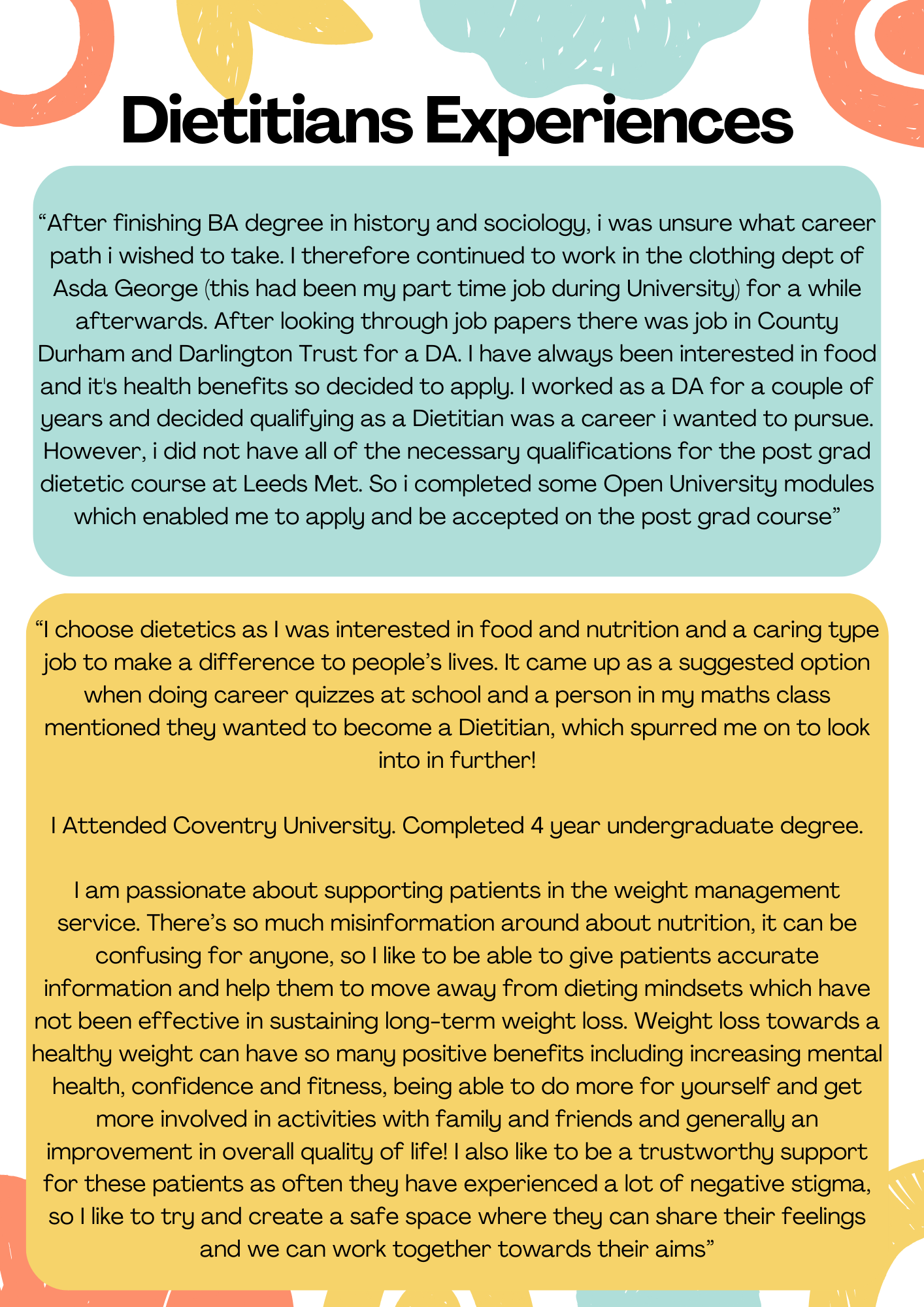Katie Hill
Dietetic Assistant

Becoming a Dietitian: From Support Worker to Registered Dietitian

Article Written by Niamh and Krista, Dietetic Students at Teesside University.
AHP stands for Allied Health Professionals which is defined as degree level professionals who work autonomously, and they are the third largest clinical workforce in health and care. These professionals are important because they assess, treat, diagnose and discharge patients in a system wide care approach. Focuses of an AHP is prevention and improvement to patients’ health and wellbeing through an holistic approach from birth to palliative care (1).
Currently there are 14 registered AHP professions who are regulated by the Health and Care Professions Council or General Osteopathic Council (2). AHP’s cover a wide range of areas which include the NHS, education, volunteer work, community, private sector, research and local authority (3).
Within these areas a variety of patient groups are seen, for example public health would be population based across the country, education with school children and research links with academia therefore students studying to become an AHP. However, the main area for AHP’s is the NHS which involves lots of different patient groups including frailty/elderly, stroke, oncology, neurological disorders, paediatrics, renal, gastrointestinal, critical care and weight management. These patient groups can be seen within the hospital as an inpatient or outpatient clinics, in the community at their own homes, assisted living, care home or community hospitals and virtual clinics which would be a phone call.
AHP’s work in collaboration with othe healthcare professionals in a multidisciplinary approach. Therefore, many of the 14 professions link with one another when giving patient care
A dietitian is one of the 14 Allied Health Professionals, and their role involves assessing, diagnosing and treating nutritional problems through using up to date research and converting this to practical support and plans for patients (4).
This is an important role because they can help support a range of conditions that negatively affect health such as diabetes, irritable bowel syndrome, coeliac disease, overweight/obesity, eating disorders, allergies/intolerances, kidney failure and malnutrition. Furthermore, they cover a variety of settings which support the countries dietary needs. These setting include NHS, private, learning disabilities, mental health, catering education, sport and food industry therefore similar to many other AHP’s.
As part of a dietitian’s role, they work alongside other healthcare professionals including other AHP’s to provide the best patient care possible. Key AHP’s they link with is speech and language therapists as these AHP’s assess a patient’s eating, drinking and swallowing abilities which highly affects what the dietitians plan will be (5).
For example, if the patient has swallowing difficulties and need to be put on texture modified diet and fluids then certain foods and drinks will not be safe for them to consume including oral nutritional supplements meaning plans need to be adjusted based on the speech and language therapist IDDSI (International Dysphagia Diet Standardisation Initiative) recommendations (6).
Additionally, Physiotherapists and Occupational Therapists strongly link with Dietitians specifically in the acute setting as all three of these AHP’s see many of the patients on the ward to help with recovery and support discharge plans.
Similarly to all other AHP’s an approved degree is needed to become a dietitian however there is a few routes into this.
Each route should be accredited by the Health and Care Professions Council (HCPC) as this is a legal requirement to practice as an AHP to ensure the standards of the profession are being met (7). Sometimes a career specific national body will also approve the university course such as The British Dietetic Association (BDA).
The courses available at university for dietetics include a BSc undergraduate programme which is between 3-4 years, a postgraduate diploma which is 2 years in length and a MSc postgraduate programme which is also 2 years.
The majority of universities in the UK offer these courses as full time however some universities have started a degree apprenticeship programme which involves working alongside getting your dietetic degree either as a undergraduate or masters level (8).

We asked a group of Dietitian's their route into becoming a Dietitian
The AHP support workforce comprises support workers, senior support workers, assistants, and assistant practitioners. This workforce works alongside registered AHPs to provide high quality care to patients of all ages, across a range of acute and community settings (9).
I worked for nearly 18 months as a dietetic assistant in both an acute and community setting for the NHS. I graduated from Leeds Beckett University with a Sport and Exercise Science degree and applied for this assistant role at my local hospital. I was accepted for this in August 2022 and stayed there until January 2024. I had an interest in nutrition since doing modules on it at college and then university therefore I thought an assistant role would be a good opportunity to see if I liked this career as a dietitian.

My job title was dietetic assistant and home enteral feed (HEF) coordinator therefore I had a bit of a split role, all being linked to dietetics.
Throughout the time I was in this role I had the opportunity to experience lots of different things and expand my knowledge in the area. I was able to work within a larger dietetic team, work in a large acute hospital, work in a multi-disciplinary way with other health professionals and AHP’s including attending MDT’s and I was able to see both the acute and community side. Most importantly for me it confirmed I wanted to become a dietitian which is when I looked into the different routes available to me.
I had an interest in nutrition since doing modules on it at college and then university therefore I thought an assistant role would be a good opportunity to see if I liked this career as a dietitian.
This was an amazing opportunity for me straight out of my undergraduate degree and it allowed me to understand how a dietitian works and what a dietetic department is like, it enhanced my interest in food and nutrition after I could see the difference it made to patients and finally it was a role that increased my understanding of many different topic areas linked to dietetics due to the wide variety of roles I had within the job.
For me I had a feeling I wanted to be a dietitian since college and within the first 6 months of starting this role I knew this was confirmed and that was the career path I wanted to take. I discussed a few options with my manager and looked into the different routes on the BDA website. I then decided the best option for me was to leave the job and start on the 21 months MSc. The positives of this was that it was the quickest route for me, I could focus solely on university studies and placement and there was more of a variety of universities to apply for. Despite this there is a few challenges which include being an intense course that makes it difficult to work alongside therefore finances need to be considered, I had to leave my current dietetic assistant job even though it was giving me good experience and I needed a 2:1 or above in an undergraduate degree linked to nutrition and science.
I had a feeling I wanted to be a dietitian since college and within the first 6 months of starting this role I knew this was confirmed and that was the career path I wanted to take
Alternatively, when you are a support worker for an AHP you could take the apprenticeship route if this is available for your role. Within dietetics it is a new route that is offered by some universities in the country.
The apprenticeship involves working alongside completing your degree which is often equivalent to an undergraduate level. It requires your organisation that you work for to put you through the course which means it is a much cheaper option while you still earn your assistant wage throughout and also continue to get plenty of experience in dietetics (11). This is often a 3-year course and due to it being a new route for dietetics I found it would take a while for the organisation to put me through it after other dietetic assistants who had being working longer.
Despite my choices for not doing this route it is a good option because financially you can still earn, and you are likely to have a job at the end of it in the trust that put you through the course. However, it is a longer course than the MSc and it can be quite intense due to managing work caseloads as well as university work, you also often need to be an assistant beforehand to be considered for the apprenticeship
This pathway into dietetics is a direct route and doesn’t require individuals to have prior experience as a support worker.
The undergraduate degree usually takes 3-4 years to complete. Each course is accredited by the BDA and approved by the HCPC.
Depending on the university you choose, some applicants may need to attend an interview with academic staff. Be sure to check the specific requirements on the universities’ websites.
Positives:
Challenges:

Dietitians Experiences of entering the profession
In my experience, the route of becoming an assistant before studying to be an AHP is a good route as the throughout the job the experience gained and knowledge developed helped with the application for the masters course and supported me at interview due to knowing about dietetics in detail.
Additionally, since starting my degree 7 months ago I have noticed that the conditions we study I have good background knowledge on which allowed me to achieve good grades in the first academic semester. Furthermore, going into my clinical placements, I was very familiar with a hospital environment and a dietetic department meaning I was ahead of where I should have been at that stage of the course. Despite this for one of my placements I was in a non-clinical leadership setting which my dietetic assistant role was very different to and it was good to compare the differences and bring in some of my skills from my clinical role and apply it to this very different setting.
To conclude being a support worker is beneficial because it:
Take a look at Katie, Dan's and Henna's Inspirational Stories where they also share their experiences of working as support staff and taking the next step in the career journey to become a registered Dietitian.

References